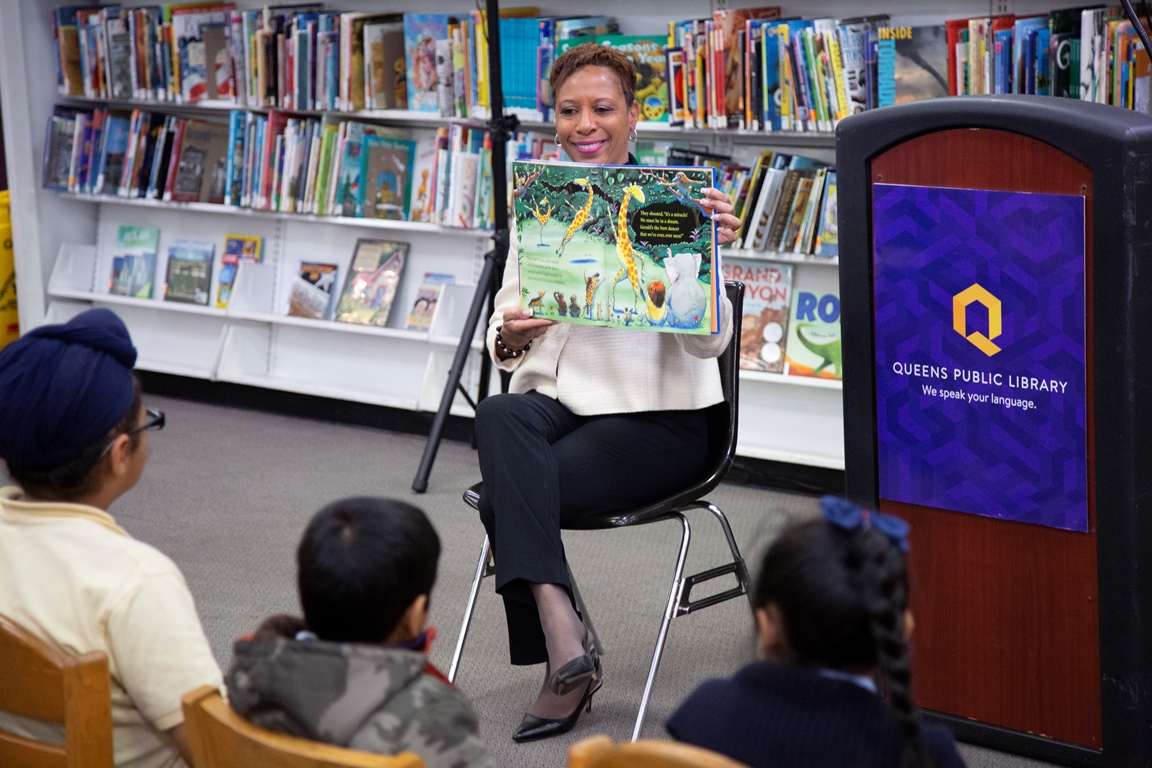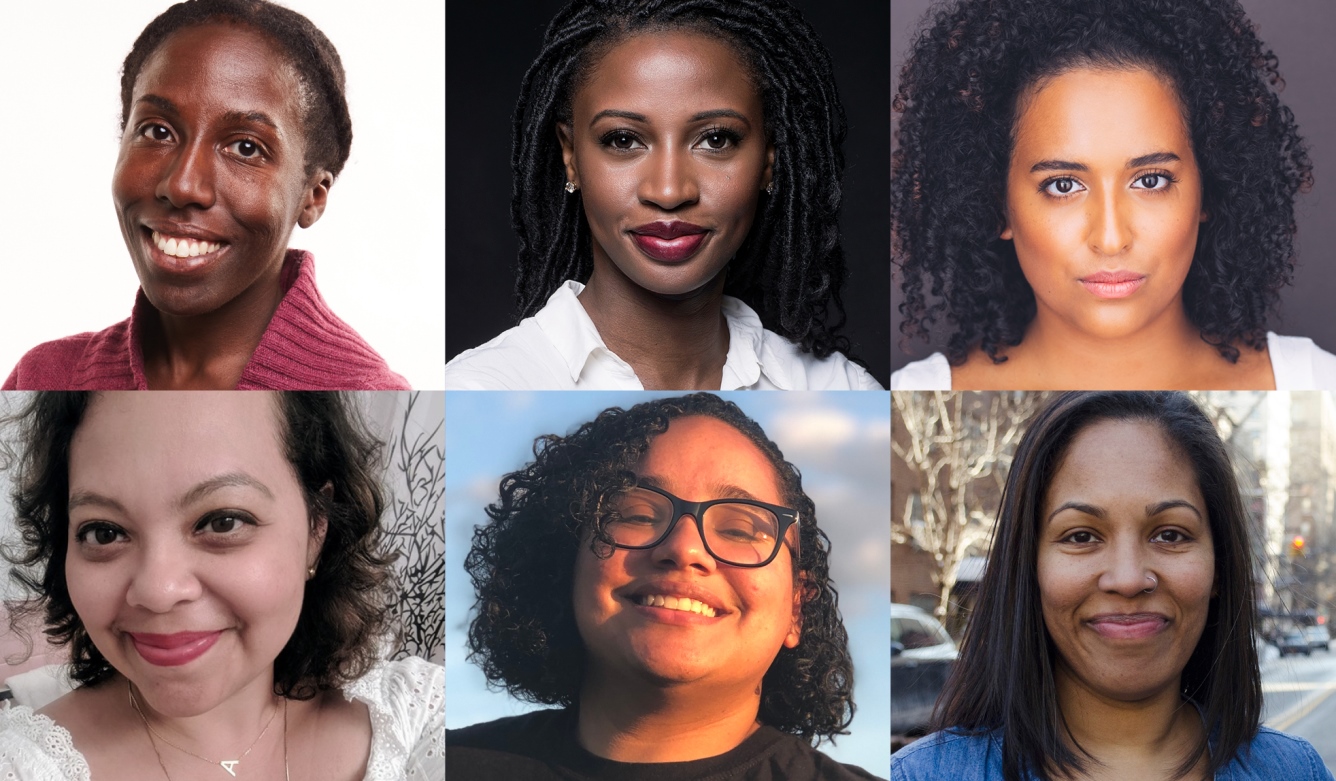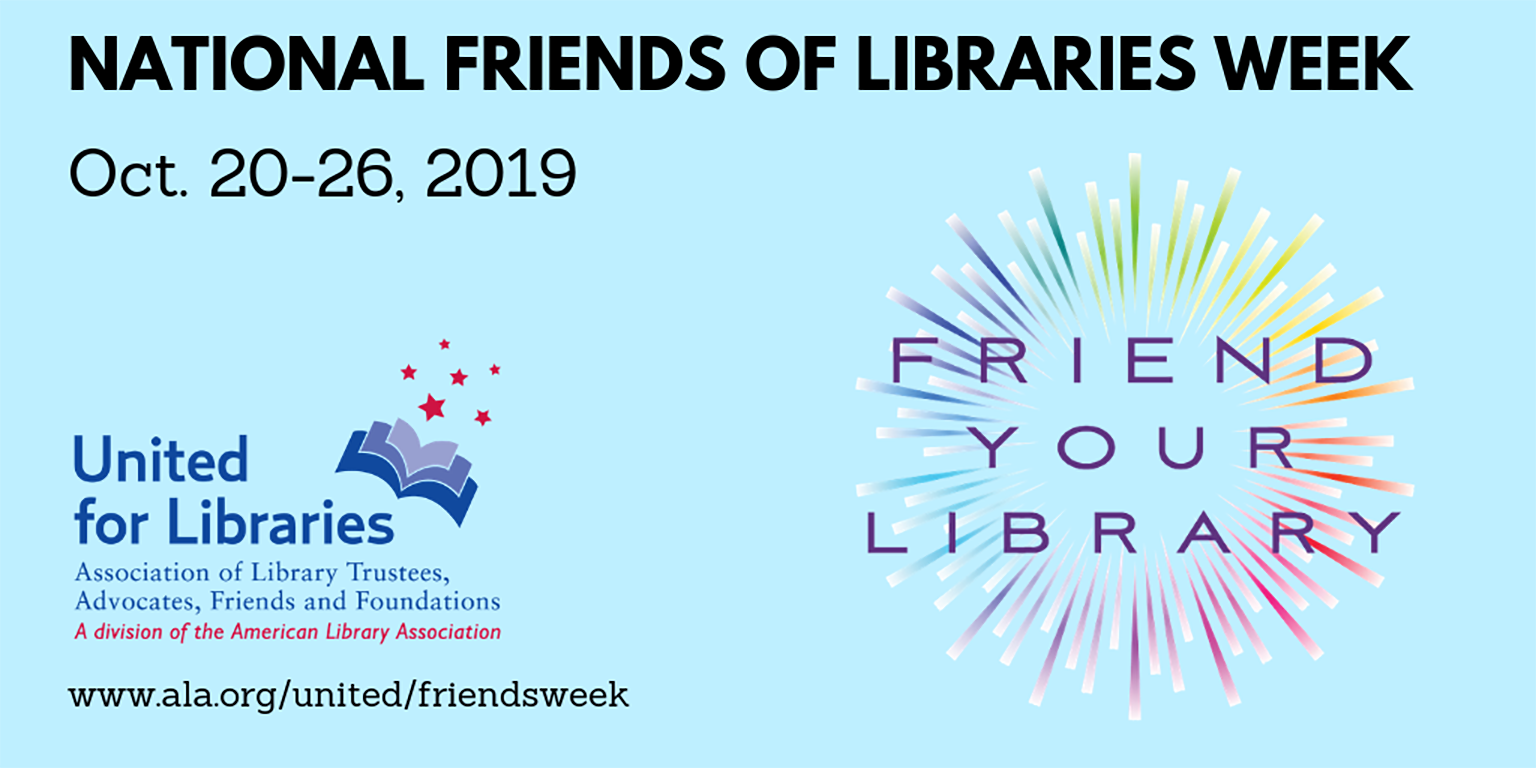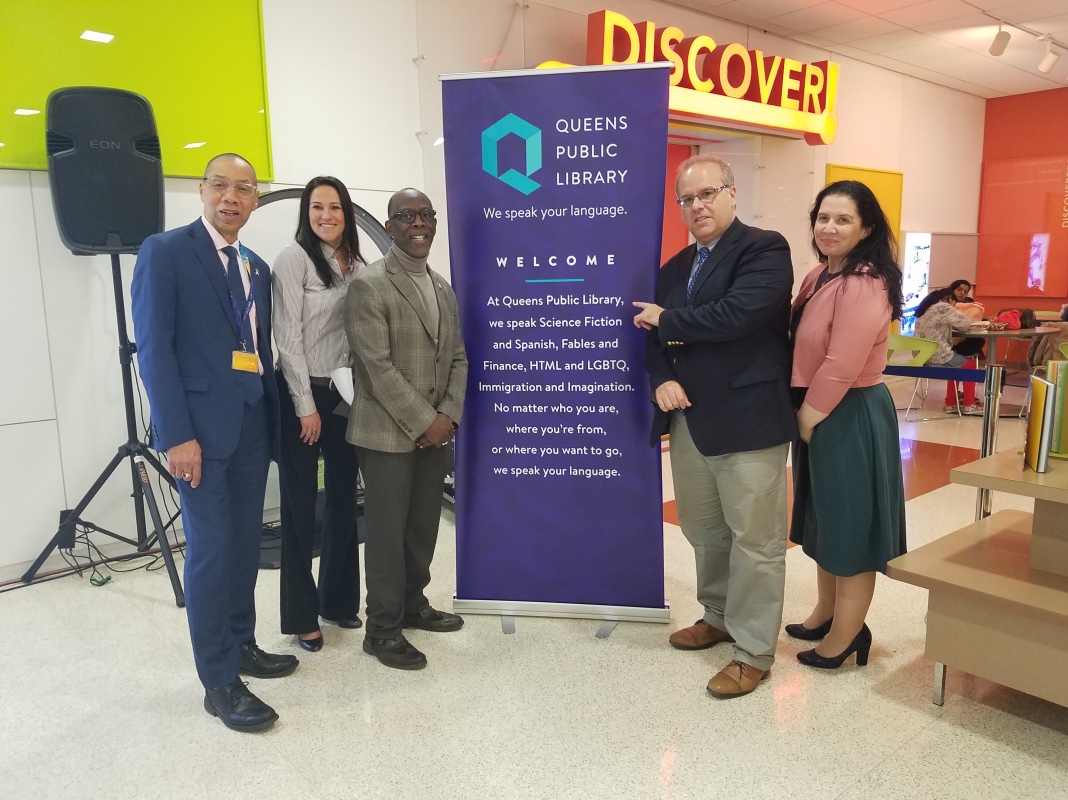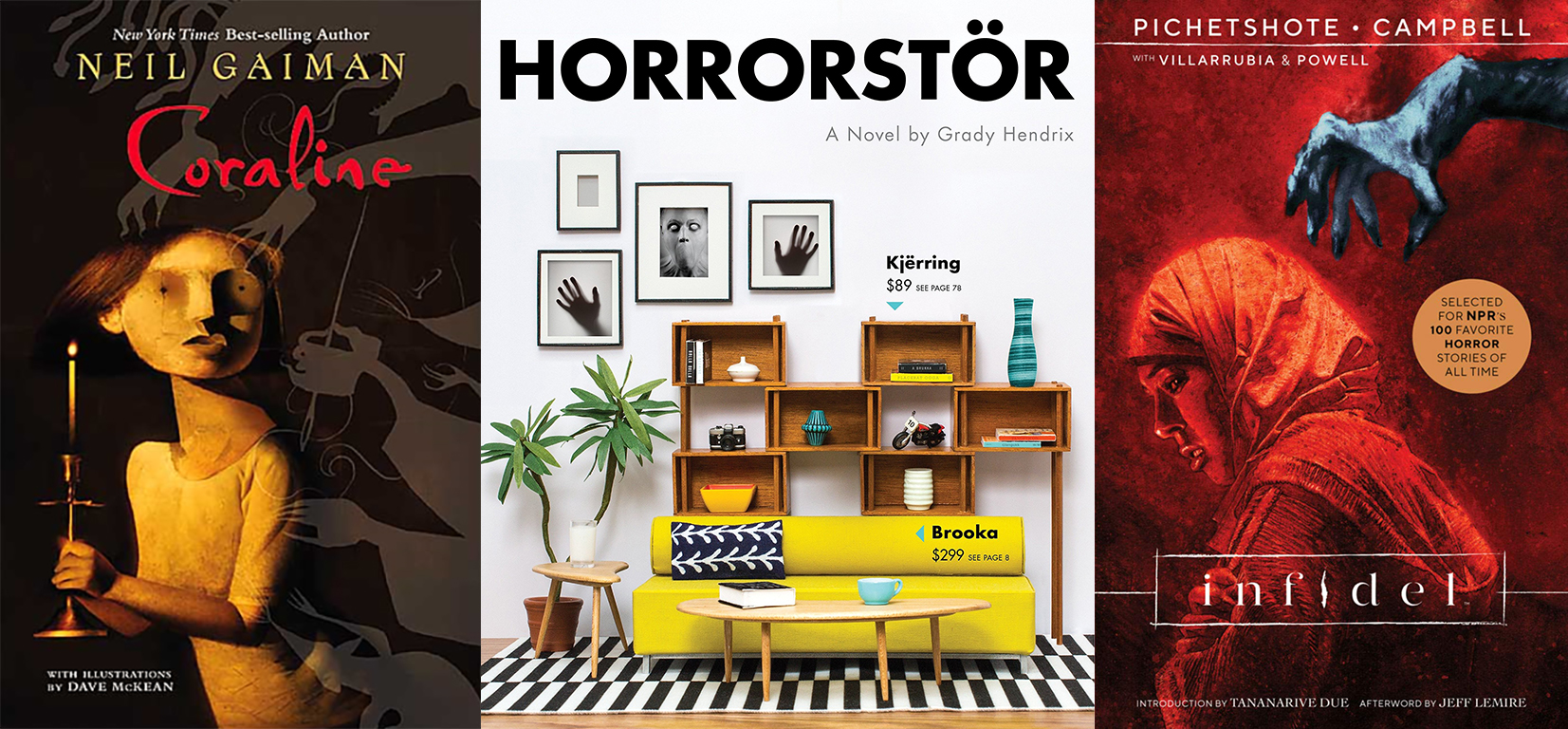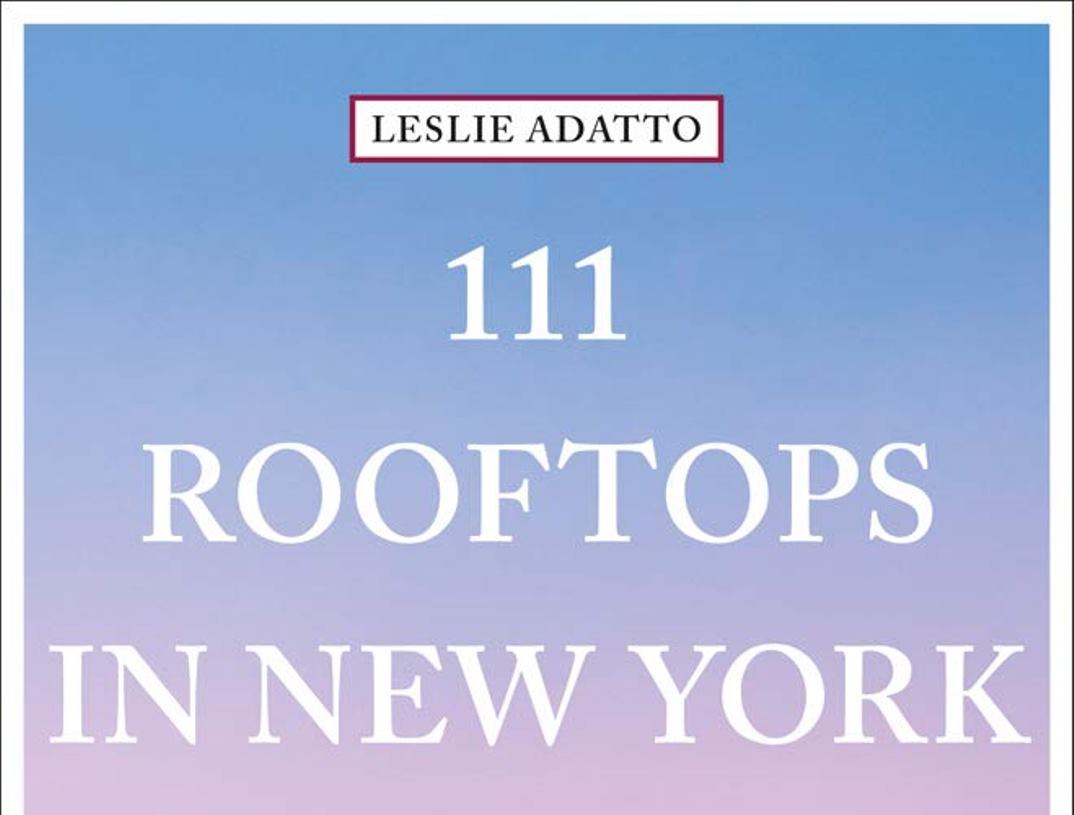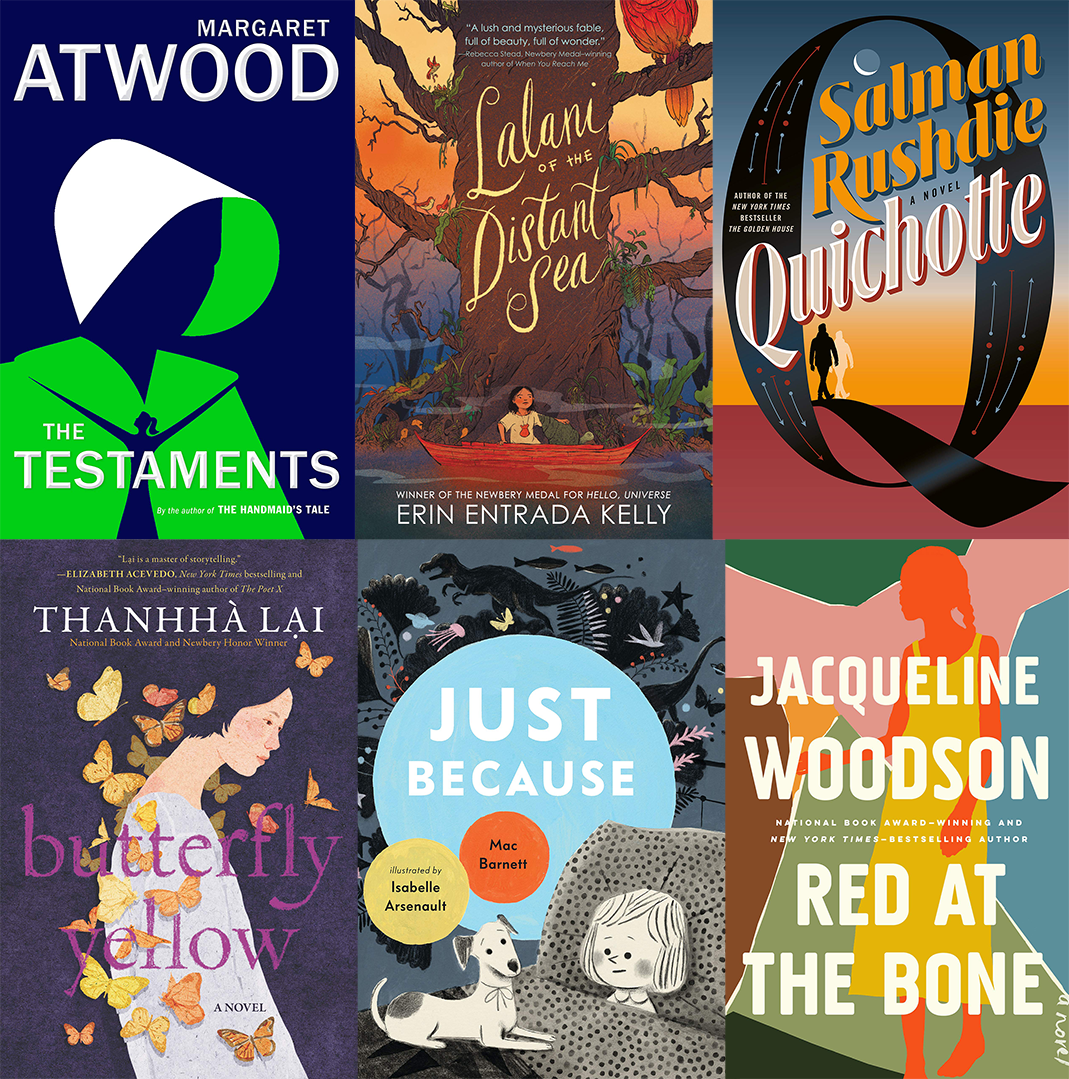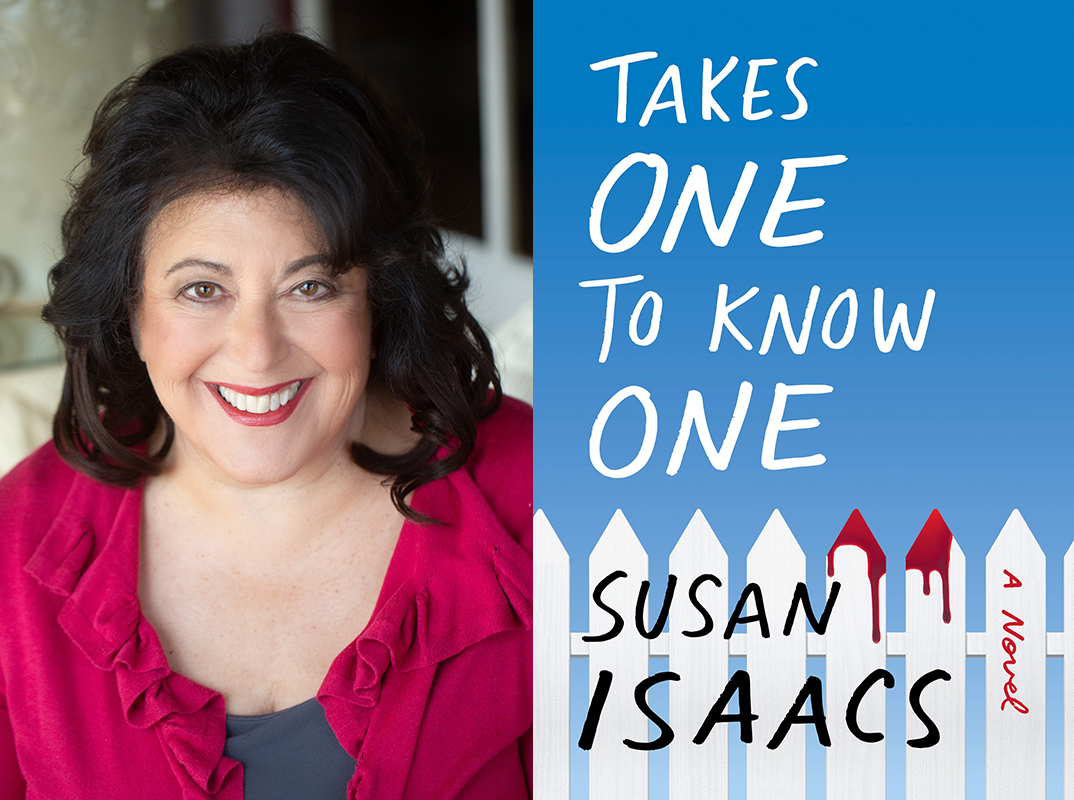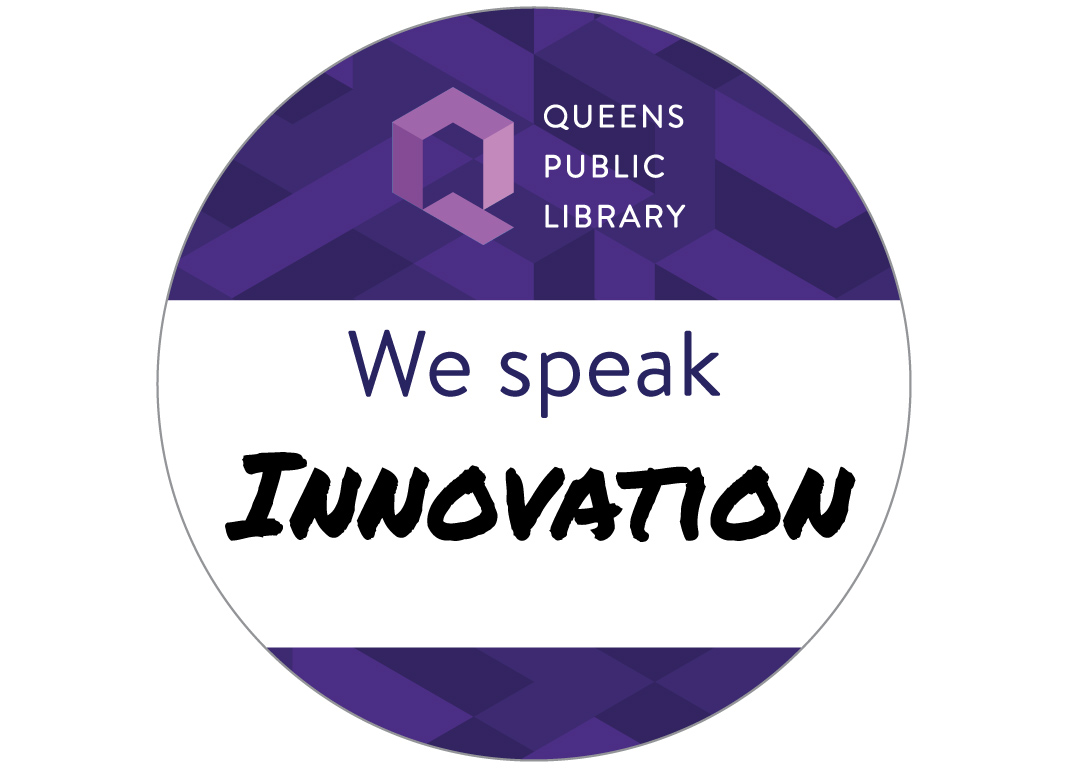FOR IMMEDIATE RELEASE
Monday, October 28, 2019
Council Member Adrienne Adams Celebrates South Ozone Park Library Reopening
South Ozone Park, New York—On Friday, October 25th, Council Member Adrienne Adams, in conjunction with the Queens Public Library, celebrated the reopening of the South Ozone Park Library. The branch reopens following a much needed $579,000 roof replacement project. This project will ensure the resilience of the structure of this popular branch that has fostered intellectual curiosity for so many years.
Council Member Adrienne Adams, Queens Public Library President and CEO Dennis Walcott and local community leaders celebrated the grand reopening with a special storytime for local students, conducted by Council Member Adams, and free giveaways for attendees.
“Public libraries are community spaces where residents of all ages can expand their horizons,” said Council Member Adrienne Adams. “I am proud to have provided funding for this important project. The community has eagerly anticipated the reopening of the South Ozone Park Library and I could think of no better way to celebrate than sitting down with local youths for storytime.”
“Queens Public Library is committed to creating safe, welcoming spaces that inspire our customers to pursue knowledge, information or a path to new opportunities,” said Queens Public Library President and CEO Dennis M. Walcott. “As we celebrate the reopening of our South Ozone Park branch, we are grateful to Council Member Adrienne Adams for allocating capital funds to replace the roof, allowing the community to continue benefiting from our resources, including early literacy programs, such as this storytime.”
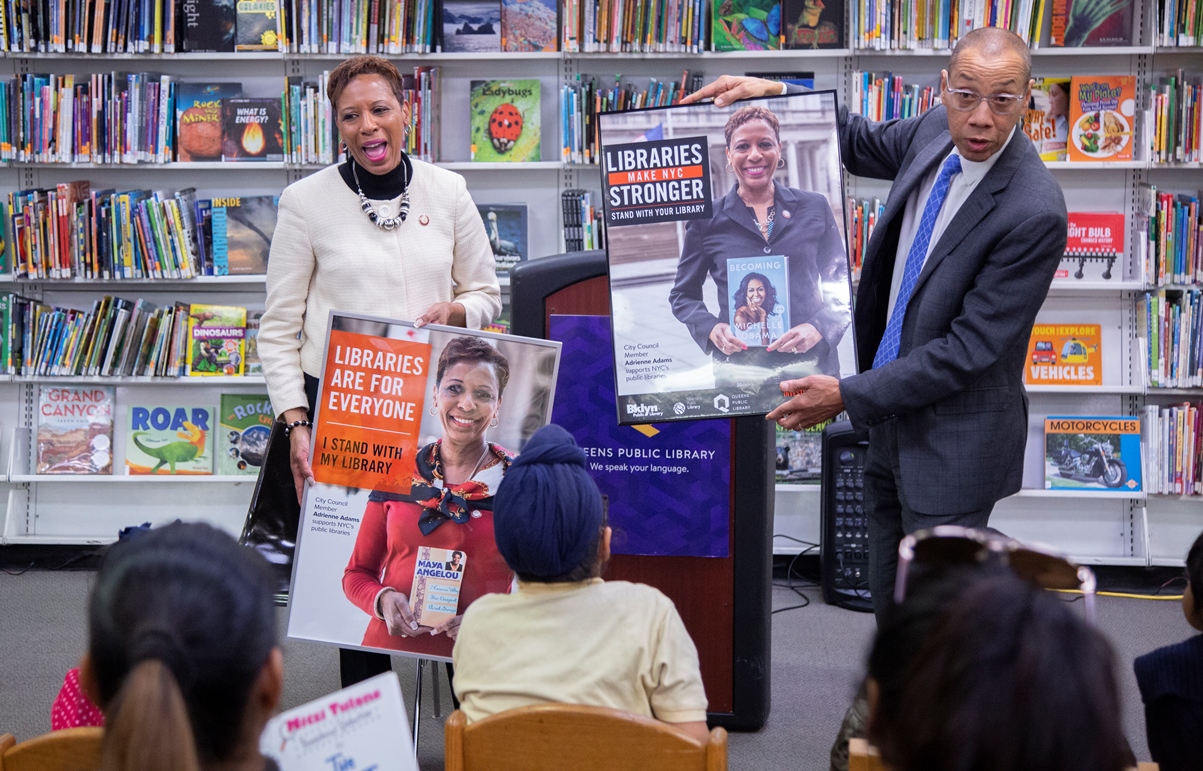
Council Member Adrienne Adams represents City Council’s 28th District, which includes the Queens neighborhoods of Jamaica, Richmond Hill, Rochdale Village and South Ozone Park. She serves as Chair of the Subcommittee on Landmarks, Public Siting and Maritime Uses and sits on the Civil Service and Labor; Finance; Land Use; Parks and Recreation; Public Safety; and the Rules, Privileges and Elections Committees.
Photos of NYC Council Member Adrienne Adams and QPL President & CEO Dennis M. Walcott at South Ozone Park Library by John McCarten.
Contact:
NYC Council: Stacey Yearwood, syearwood@council.nyc.gov, (212) 788-6850, (646) 596-0465
QPL: Ewa Kern-Jedrychowska, ekern@queenslibrary.org, (718) 990-0706, (917) 702-0016
###
On Saturday, November 2, join us at Langston Hughes Library for the 11th Annual Literary Arts Festival! This is an opportunity to meet and hear from prominent and emerging writers, learn more about the publishing industry, and see a performance.
The festival includes a film about Langston Hughes, author Wayétu Moore in discussion with Regina Bernard-Carreño, and a presentation by publishing professional Jennifer Baker. It also features an open mic, a Newtown Literary poets’ panel moderated by Allison Escoto, and a Literature to Life presentation of Junot Diaz’s The Brief and Wondrous Life of Oscar Wao.
Queens resident Jennifer Baker says, "As a publishing professional of over 16 years, much of what I've done in my work has been to make connections. Not necessarily in the sense of the sometimes obscure idea of 'networking,' but more so to build relationships, particularly between those in marginalized communities in an industry we're not always visible in."
"My podcast, Minorities in Publishing, is a testament to the work, joys, and experiences marginalized people (including BIPOC--Black, Indigenous, People of Color) have faced within publishing," Baker continues. "In discussing this on Saturday, I want to frame things honestly as well as hopefully. Many of us are here doing this work and we're looking forward to the additional faces to be added to publishing over the years as creators and industry professionals."
The festival’s theme is Raising Consciousness through Literature, and the poets’ panel will discuss writers of color as whole people. Moderator Alison Escoto is the head librarian at the Center for Fiction.
Read about festival speaker Wayétu Moore in our magazine article from March/April 2019. Moore’s debut novel, She Would Be King, was named a best book of 2018 by Publishers Weekly, Booklist, Entertainment Weekly, and BuzzFeed. She is a 2019 Distinguished Visiting Writer at Syracuse University’s MFA program.
Suggested for ages 13 and up, Literature to Life’s The Brief and Wondrous Life of Oscar Wao is an adaptation of the Pulitzer Prize-winning novel by Junot Diaz, about an overweight science fiction enthusiast who dreams of becoming the Dominican J.R.R. Tolkien.
Don't miss this thought-provoking and inspiring day!
Happy National Friends of Libraries Week! It’s the annual celebration of library Friends groups and everything that they do to support their neighborhood libraries.
It was no coincidence that QPL and our Government & Community Affairs department held our annual Friends Mid-Year Conference on Saturday, October 19 at Cambria Heights Library, with our special keynote speaker, Congressman Gregory Meeks! Thank you to all the Friends members who joined us that day.
According to a 2012 United for Libraries survey, Friends groups raise, on average, over $50,000 for their libraries each year.
There are currently 26 Friends of the Library groups throughout the borough of Queens. They create public support for their library branches, sponsor programs that enhance the cultural life of their communities, serve as legislative advocates for Queens Public Library, and much more!
Our Friends make sure that the communities we serve and the elected officials who represent them know that people care deeply about their local public libraries.
If you'd like to join an existing Friends group, or start your own chapter for your neighborhood library, contact your local Community Library Manager, or send an email to friends@queenslibrary.org.
Thank you again to all the Friends of Queens Public Library!
FOR IMMEDIATE RELEASE
Wednesday, October 23, 2019
OATH Resource Fair Coming to Central Library on October 30, 2019
QUEENS, NEW YORK - On Wednesday October 30, 2019 the NYC Office of Administrative Trials and Hearings (OATH), which is the City’s independent administrative law court and where nearly every City agency files summonses for hearings, will partner with Council Member I. Daneek Miller and the Queens Public Library to have staff present at the Queens Public Library’s Central Library, located at 89-11 Merrick Blvd, Jamaica, New York. Staff will be at the library on October 30, 2019 from 10:00 a.m. to 4:00 p.m.
OATH will be there to answer any questions people have about what to do if they receive a summons from a City agency, such as the Sanitation Department, Health Department, Buildings Department, Fire Department, Parks Department, NYPD, among many others City agencies that issue summonses to individuals, property owners and small business owners.
OATH staff will be able to provide the following services through this new outreach initiative: check to determine if someone or a property has any outstanding summons; check the status of summonses; help people understand the rules about how a summons can and should be responded to when one is received; help people submit online defenses to summonses that are eligible to be responded to remotely; help people reschedule upcoming hearings or request new hearings if summonses were previously ignored; and explain what may be required after a hearing has been held.
"Libraries are highly trusted institutions that offer safe spaces for people to ask questions and receive reliable information,” said Queens Public Library President and CEO Dennis M. Walcott. “We are pleased to partner with the City’s Office of Administrative Trials and Hearings and Council Member Daneek Miller to bring valuable resources to our customers, providing them with the tools they need to interact more effectively with City government.”
“We are excited to be partnering with OATH and the Queens Public Library to help homeowners and small businesses navigate the nuances of government,” said Councilman I. Daneek Miller. “We have always sought to provide as much support as possible to our constituents, who may not always know how to navigate the system and risk being penalized with additional fines. Homeowners in our district deserve an enhanced quality of life and small businesses deserve access to the tools they need to thrive.”
“New Yorkers and small businesses deserve a level playing field when contesting City-issued summonses. OATH Resource is a new initiative meant to bring government to where people work and live. The initiative provides New York City’s small businesses and residents with a convenient place to go in their local neighborhood to get the information they need to handle summonses correctly and to find out if they have any unresolved summonses that have been issued to them, their property or their business. Knowledge is power and the first step to fighting City summonses is understanding the process and what to do if and when a summons is received," said OATH Deputy Commissioner for Public Affairs, Marisa Senigo.
“The library is a tremendous resource for all of us. When a Queens resident visits the Central Queens Public Library to get information and borrow books on October 30, 2019 they can learn about what to do when they get a summons from a city enforcement agency by finding OATH Resource near the library’s non-fiction and reference sections,” said OATH Deputy Commissioner John Castelli.
About OATH
The NYC Office of Administrative Trials and Hearings (OATH) is the City’s independent administrative law court where nearly all City enforcement agencies such as the Departments of Sanitation, Buildings, Health and Mental Hygiene, Parks, Environmental Protection, Fire, NYPD, Consumer Affairs, and the Taxi and Limousine Commission, among many others, file their summonses for hearings. OATH, however, is not the court that is responsible for holding hearings on parking tickets or traffic tickets.
Last year, OATH received nearly 870,000 summonses from NYC enforcement agencies and held more than 330,000 hearings. 47% of all summonses that were fought at OATH hearings were dismissed.
OATH offers recipients of summonses convenient hearings options such as Hearings Online, Hearings by Phone, Hearings by Webcam and Hearings by Mail. It also offers free translation services for all hearings as well as for all document and form submissions. Additionally, OATH has Help Centers at all hearing locations where self-represented respondents can go to get help understanding what a summons is charging them with and the possible penalties associated with the summons; the OATH hearing process; or get help accessing information or records that they believe will help their case.
About Queens Public Library
Queens Public Library is one of the largest and busiest public library systems in the United States, dedicated to serving the most ethnically and culturally diverse area in the country. An independent, non-profit organization founded in 1896, Queens Public Library offers free access to a collection of more than 5 million books and other materials in multiple languages, technology and digital resources, and more than 87,500 educational, cultural, and civic programs a year. It consists of 66 locations, including branch libraries, a Central Library, seven adult learning centers, a technology lab, two universal pre-kindergartens, and two teen centers.
Contact:
OATH: Marisa Senigo, msenigo@oath.nyc.gov, (212) 933-3080, (646) 285-3619
QPL: Ewa Kern-Jedrychowska, ekern@queenslibrary.org, (718) 990-0706, (917) 702-0016
###
We asked our librarians to tell us their favorite horror books. Here are their suggestions:
“These kids’ books are pretty good and worth giving a try, whether you're an actual kid or just an adult who likes happy endings. Coraline by Neil Gaiman is a great mix of creepy characters and setting without being overwhelmingly disturbing. The eponymous heroine is brave but human and the story has a satisfying conclusion. The library has copies of the original and graphic novel version.
The Night Gardener by Jonathan Auxier has some terrific suspenseful storytelling, with elements including a spooky tree, mysterious shadows in the night, an ancient curse, and orphaned siblings in Victorian England. Again, it’s scary enough but not too disturbing, with a solved mystery and happy characters at the end.”
Leah Hoenig, Children's Librarian, Flushing
“I am recommending Cardinal Black by Robert R. McCammon. This book is new, popular, and highly rated on Goodreads. Publishers Weekly wrote, 'As usual, McCammon dazzles the reader with gritty historical detail, vivid local color, and a cast of memorable grotesques, among them the Owl, who can literally watch his own back by disjointing his neck. Series fans will find this entry a thoroughly enjoyable extension of McCammon’s evolving period epic.'”
Shaimaa Hussein, General Librarian, Richmond Hill
“My go-to horror author lately has been Grady Hendrix. Love his mix of snarky humor, '80s pop culture, and straight-up horror.
Horrorstör by Grady Hendrix: How can you not read a horror story that takes place in an IKEA? Okay, it's actually ORSK, a thinly veiled IKEA knockoff, but still: a haunted Scandinavian furniture store, product descriptions and store maps, and three employees who stick around for an overnight shift. It's horror gold, with plenty of skin-crawling, something-is-watching-me moments. I love it.
We Sold Our Souls by Grady Hendrix: This is late '80s and '90s hard rock/heavy metal, selling souls to the devil, and the fallout some thirty years later. This feeds right into the Satanic Panic and record labeling of my teen years, when everyone was afraid that Dungeons and Dragons and heavy metal music were going to bring about the downfall of society. There are some truly terrifying moments in here, along with great rock and roll references.
Paperbacks from Hell by Grady Hendrix: This is a love letter to the '70s and '80s paperback horror novels and, just as important, the artwork of those novels. Demonic Nazi gnomes, sewer alligators, and evil children everywhere: it's all lovingly, hilariously, organized and described in here. This is the perfect reading list for horror fans."
Rosemary Kiladitis, Assistant Community Library Manager, Corona
“I recommend the graphic novel Infidel by Pornsak Pichetshote, and artist Aaron Campbell, editor and colorist Jose Villarrubia, and designer and letterer Jeff Powell.
A young American Muslim woman moves into an apartment building that was recently the site of a suspected terrorist attack. While her white atheist husband is concerned with protecting her from his Islamophobic mother's vitriol, she finds her mother-in-law welcoming. However, the building has other ideas. At first, she believes the twisted, gnarled, hate-filled spirits she sees are products of hallucination, but they are real and deadly. Infidel infuses a modern look at Islamophobia, anger, racism, fear, and rage into the classic haunted house story and emerges with something terrifying that every horror fan should read.”
Amber Loveless, Assistant Community Library Manager, Queensboro Hill
We asked Leslie Adatto, author of 111 Rooftops in New York That You Must Not Miss, for some of her favorite Queens rooftops. These are her selections:
Queens has a huge variety of public access rooftops, and here are a few notable ones.
Brooklyn Grange Flagship Farm on Northern Blvd. in Long Island City is a happy surprise in the sky! The first of Brooklyn Grange’s three rooftop farms, this site, at just under an acre, is where the innovative urban farmers, who had a radical idea to farm on the city’s rooftops, began and honed their skills through some trial and error. What they came up with is a functioning, profitable rooftop farm that serves local restaurants and has a CSA (community supported agriculture) program for locals to get roof-grown produce. The Grange has also become a popular event space for farm dinners, fund raisers, and corporate events. They have a weekly open house during the growing season, and if you haven’t been up there to enjoy the farm, the view, and the sheer joy of this unexpected rooftop, make sure you get there!
Upper 90 Soccer Center in Astoria transformed a former garage into a rooftop urban soccer oasis. At ground level is a soccer sporting goods store, a kiddie-sized soccer pitch, and a trendy coffee shop. Up on the roof are two soccer pitches that are used extensively by people who love the game. There are organized matches, as well as pick-up games. Just check their website for what suits your needs. Upper 90 also uses its fabulous artificial turf covered roof as a unique setting for private events like birthday parties, and for rooftop yoga and fitness classes.
Ravel Hotel in Long Island City has two completely different roof elevations. Penthouse 808 is the bar/restaurant/club that has an unobstructed view over the East River and directly into the iconic 59th Street Bridge. Penthouse 808 has a lot of romantic appeal and is a popular place for couples to become engaged. They also host weekly Jazz Brunches with dancing, club nights, and after-work drinks and snacks. On the back side of Ravel Hotel is the pool roof deck, which is open all summer, and has a completely different Miami-style vibe. Around the pool are lounge chairs and places to get terrific food because guests who are not lodging at the hotel can buy day passes and stay all day into evening.
Leslie Adatto will be speaking at Hunters Point Library on Saturday, November 2, at 2:30pm.
Here are some of the new books coming to the Library for adults, children, and teens—from bedtime stories to novels by celebrated authors to travel sagas.
September 3, 2019
Quichotte (adult)
by Salman Rushdie
Starred by both Publishers Weekly and Kirkus, this novel tells the story of a writer who is inspired by Don Quixote to invent his own character who is madly in love with someone who is out of reach.
September 3, 2019
Butterfly Yellow (YA)
by Thanhhà Lai
Viet Than Nguyen, Elizabeth Acevedo, and Matt de la Peña have all praised this novel, which was starred by both Booklist and Kirkus. The book chronicles children’s experiences as Vietnamese refugees.
September 3, 2019
Lalani of the Distant Sea (children)
by Erin Entrada Kelly
Filipino folklore inspired this fantasy novel from Newbery Medal winner Kelly. The book has been acclaimed with starred reviews from Booklist, Kirkus, and Publishers Weekly.
September 10, 2019
The Testaments (adult)
by Margaret Atwood
Literary icon Atwood delivers a sequel to her bestselling cultural touchstone The Handmaid’s Tale.
September 10, 2019
Just Because (children)
by Mac Barnett
Kirkus praises both the words and illustrations of this book that seeks to go far beyond the common, unsatisfactory answer to children’s questions about why—“Just because.”
September 10, 2019
The Other Side: Stories of Central American Teen Refugees Who Dream of Crossing the Border (YA)
by Juan Pablo Villalobos
Award-winning author Villalobos presents the real-life stories of eleven migrant teenagers who try to cross the border into the United States. These riveting accounts depict the tremendous hope and desperation that fuel treacherous journeys north—and provide an intimate window into the refugee crisis.
September 17, 2019
Red at the Bone (adult)
by Jacqueline Woodson
From the National Book Award-winning author of Brown Girl Dreaming, this novel explores the impact that decisions we make in our youth have across time as they reverberate through generations. Set in Brooklyn, the book was starred by both Kirkus and Publishers Weekly.
October 1, 2019
The Kindness Book (children)
by Todd Parr
New York Times bestseller Parr uses colorful drawings to emphasize for young readers that you always have a choice to be kind.
October 3, 2019
The Secret Commonwealth (Book of Dust, Volume 2) (YA)
by Philip Pullman
This is the second book of Pullman’s new trilogy set in the world he established in his beloved His Dark Materials series. The novel features twenty-year-old student Lyra as its protagonist.
October 8, 2019
On The Plain of Snakes: A Mexican Journey (adult)
by Paul Theroux
Acclaimed novelist and travel writer Paul Theroux presents a timely chronicle of life on the Mexican-U.S. border as well as deep inside our southern neighbor.
Books for Back-To-School
The Pigeon Has To Go To School
by Mo Willems
A pigeon confronts his fears about going to school.
The Stressed Years of Their Lives: Helping Your Kid Survive and Thrive During Their College Years
by Janet Hibbs and Anthony Rostain
Two leading mental health experts provide a comprehensive guide to how you can support your child so they will be successful in college.
The Forest Hills library was Susan Isaacs’ haven during high school—and this fall, she’ll be returning to talk about her latest novel, Takes One To Know One. (Get your free tickets!)
Isaacs, the author of fourteen novels, says the library was “my Versailles, the palace of excess. So many books!”
All she ever wanted from a library “was permission to enter and to leave with my arms full of books. To create my own education, to explore the universe on my own. I got precisely what I wanted. Even now, I am filled with gratitude.”
The author uses libraries today to search for a novel she may have missed and to do her research, and she appreciates the value only librarians can offer. As she explains, “Sure, it’s easy to Google ‘Russian mob in US,’ but then you get the answers—too many, and how do you weigh their value? When there’s an obscure journal cited or simply too much information to pursue, I depend on the wisdom of librarians. They know where and how to look.”
Her latest book, which comes out in October, is inspired by the push-pull between adventure and secure ordinariness. It tells the story of a woman who is retired from the FBI’s Joint Terrorism Task Force, ostensibly enjoying normality in the suburbs with her family. While working as a book scout for contemporary Arabic literature and lunching with a freelancers group, she spots something “off ” and sets out to investigate it.
Isaacs says that her female protagonists have always fought to be strong in the face of adversity. Now that she’s writing a mystery series, she wanted her investigator, Corie Geller, to be “multifaceted enough to hold the reader’s interest from book to book.” Isaacs’ goal as an author? “I want to write the book I most desperately want to read.” She wishes she could write like Fran Lebowitz and is delighted by David Sedaris, Kate Atkinson, Edmund Crispin, Nora Ephron, and Mark Twain. “I like writers who have a delicious sense of the absurd but who are aware of the darker side of life,” she says.
Writing, she believes, “is an idiosyncratic act, like making chicken soup or making love. No two individuals do it quite the same way.” As an author, she is her own boss and writes for two to three hours every morning, followed by afternoons of editing. “If I viewed being a novelist as a calling rather than as work, if I waited for a muse to whisper in my ear, I would not be a novelist,” she maintains. “At best I would be a chapterist.”
She advises would-be authors who already have a job to make their writing their second or third job and set regular hours—even if it’s only three hours every Sunday afternoon. Thinking about her process and what motivates her, Isaacs says “it helps not to think of my work as a choice. It’s a job that I have to go to, and then I have the rest of my day to do what I want to.”
She has been compared to Jane Austen, for whom she has boundless admiration. “I like to think that right under the tablet the Statue of Liberty holds is a copy of Emma.” Reading led her to write her first novel and gave her an awareness that not only could she write, but she really wanted to do so. She jokes that she was having some dental work done when a character came into her head—a housewife who pushes to investigate a local murder—and so the choice of victim, a local periodontist, was easy.
The past president of Mystery Writers of America and the current chairperson of the board of Poets & Writers, she writes in many genres and explains that her main characters dictate the form of each book. For Takes One to Know One, she says protagonist Corie Geller asked for a whodunit/ thriller. Her favorite genre is the crime novel as she likes how the “world is set off-kilter by a violent act and how the scales of justice are righted by the detective.”
Isaacs believes reading should transport you into another world, as her current reads do: “Right now I’m reading Kate Atkinson’s mystery Big Sky and Mark Galeotti’s book The Vory: Russia’s Super Mafia. With both, I’m taken out of my life on Long Island and into two very different universes.”
After more than a dozen books, she realizes that knowing who you are is essential. “Figure out who you are and don’t let other people define you. I’m still working on that,” she explains.
Come meet Susan Isaacs at Forest Hills Library on Saturday, October 26 at 2:30pm. Takes One To Know One is available at Queens Public Library.
Photo of Susan Isaacs by Linda Nutter.
OCTOBER 4, 2019—The following is a statement from Queens Public Library President and CEO Dennis M. Walcott about Hunters Point Library:
Our goal is to be inclusive and provide access and opportunity to all. We will move the books to another location in the library and provide regular updates to the community.
For the past three years, the Queens Public Library Foundation has invited QPL staff members to submit ideas for new and innovative programs that address the specific needs of their communities.
This October, the 2019 Innovation Fund awarded grants of up to $10,000 each to eight exciting new programs throughout our borough. They demonstrate creativity and passion for engaging and supporting the public and will have a remarkable impact on their communities.
Thank you to our generous donors and to everyone who took the time and effort to submit their ideas.
Here are the winning programs; congratulations to their creators!
Older Adults Programming 3.0: Mind-Boosters for Boomers and Beyond: East Flushing and Glen Oaks Libraries will provide programs to help maintain cognitive health in older adults, including musical instrument lessons, language clubs, coding and intergenerational STEM workshops, and brain game programs. This project includes bi-monthly visits to nursing homes and senior centers.
Cambria Heights T.V. (Teen Videos): Cambria Heights Library will offer a three-month program where teens will learn the basics of scriptwriting, storyboarding, and recording audio and video in order to film a pilot episode of an original television show centered around the library.
Children Engineers Collaborative: Queensboro Hill Library will offer a four-part STEAM series that will teach children and parents about climate change and sustainability. Participants will work in teams to use architectural computer apps and kits to design a sustainable community.
#Artsivism: Creative Youth Development Programming: Ridgewood Library will offer arts-based tech programming to teens, including basic filmmaking, animation, graphic design, fashion design, and music making, to foster cultural knowledge and inspire community activism. The library will also publicly display their work.
Grand Family Fundamentals: The Flushing Library Adult Learning Center will create an intergenerational learning program for Mandarin-speaking grandparents with grandchildren in grades K-3. It includes ESOL classes, digital literacy and coping skills workshops, storytimes, and family arts and crafts programs.
2nd Chance Tech Camp: The Queensbridge Tech Lab has developed a 15-week technology training program for formerly incarcerated individuals, including classes on basic coding, graphic design, music production, and creative writing using online communication tools. The program will end with a final graduation day and showcase of the students’ work.
QPL @ Night: The Library’s Government & Community Affairs, Community Engagement & Outreach, and Volunteer Services departments have developed a program to bring together people ages 23-38 at different, non-library venues across the borough for events such as “Trivia Night,” “Sip & Paint,” and “Pizza & Politics.”
Queens Memory Project Community Archiving Ambassadors Program: Queens Memory will train staff at 10 libraries to become archiving “ambassadors.” They will learn how to properly scan documents and photographs, create metadata files, and conduct archival research, oral history interviews, and public programs.
